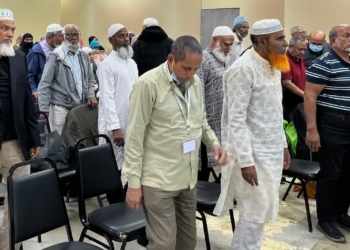Nick Bisley, La Trobe University
This weekend, the four leaders of the Quad will once again convene, this time in US President Joe Biden’s hometown of Wilmington, Delaware. The summit will double as a send-off for two of the leaders – it will be one of Kishida Fumio’s last acts as Japan’s prime minister, while Biden will end his term four months after the gathering.
The Quad is an ambitious undertaking. As the four explained in the lengthy first leaders’ communique, it exists to promote “the free, open, rules-based order, rooted in international law and undaunted by coercion, to bolster security and prosperity in the Indo-Pacific and beyond”.
Described by policy wonks as a “minilateral” to distinguish it from the broader ranging multilateral regional institutions such as ASEAN and APEC, it brings together a small group of self-styled “like-minded” nations to advance a shared set of ambitions for the world’s most populous region.
First established in 2007, the Quad brought together the four partners to discuss shared security concerns prompted by China’s growing power. Its first version was driven primarily by Washington and Japan, with both Australia and New Delhi somewhat reluctant participants. The grouping was essentially abandoned by its members in 2008. They saw little benefit in such explicitly anti-China coordination at a time when the PRC’s foreign policy remained cautious.
The Quad was brought back to life in 2017. The four now share a bleak assessment of Asia’s geopolitical circumstances. Xi Jinping’s China has an ambitious and assertive foreign policy that has unsettled the region and has prompted the four to dust off the Quad structure.
The first formal gathering was at the sidelines of the 2017 East Asia Summit. It then held a series of senior officials’ meetings in 2018 and at the foreign minister-level in 2019 on the sidelines of the UN General Assembly. Subsequent ministerial meetings were held in 2020 in Tokyo and online at the start of 2021.
Biden hosted the first leaders’ level meeting in 2021. There the group committed to an annual event to ensure sustained political momentum for a grouping that the four now see as critical to their interests in the region.
In its early days, the Quad focused on military cooperation to advance shared military concerns. But in relatively short order, it moved away from that security focus and now has developed a broad remit. The grouping has established work programs relating to climate change, public health, vaccination, high technology, infrastructure, educational exchange, maritime domain awareness, humanitarian and disaster relief and even space.
While never explicitly stated, the Quad is all about managing a collective response to China’s rise. The four are concerned by the military dimensions of Beijing’s growing prosperity, but also by the larger risks to the region’s operating system that this ambitious authoritarian power represents. While military matters prompted the Quad’s establishment, the latter concerns are now the focus of discussions.
Oddly, Economic matters are not part of the equation at present. This is a notable shortcoming, given the ways in which China uses geo-economics to advance its interests.
The Quad has been back on the international stage for over half a decade. It has moved swiftly through the gears to become a “leaders-led” grouping, with the attendant media attention, and a dramatically widened its policy remit. In spite of impressive sounding declarations and a long list of work priorities, the reality is the grouping has not achieved a great deal in terms of concrete collaboration.
As an exercise in diplomatic signalling it has been notable, and in international affairs symbols matter, but only up to a point. Achieving practical cooperation has been limited, as has its impact on the regional strategic balance.
Although the grouping is plainly a priority, the countries still are not especially well equipped to work as a foursome. This is a function of basic experience as well as bureaucratic capacity constraints. Over time, and with investment, we may expect things to improve, but it is notable that this has not been forthcoming to date.
If the Quad members want their collaboration to, in the words of a recent ministerial statement “deliver concrete benefits and serve as a force for good”, then the grouping needs to get on with the business of actual policy collaboration.
The other major challenge lies in ensuring the alignment of interests between the four countries in the future. They all share concerns about China’s growing influence, but beyond that there are some major challenges in keeping the group aligned. This is most obvious in relation to Russia, where India’s approach to Moscow is at odds with the other three. And the diverging approaches to their economies also make cooperating on that front extremely difficult.
When the leaders gather in Delaware, expect lots of bromides about the departing American and Japanese leaders as well as an even more extensive set of plans on which to work. There will be oblique references to the China challenge and high-minded rhetoric aplenty. But until the Quad actually starts to act, its ability to have an influence beyond optics will be limited.
Nick Bisley, Dean of Humanities and Social Sciences and Professor of International Relations at La Trobe University., La Trobe University
This article is republished from The Conversation under a Creative Commons license. Read the original article.











